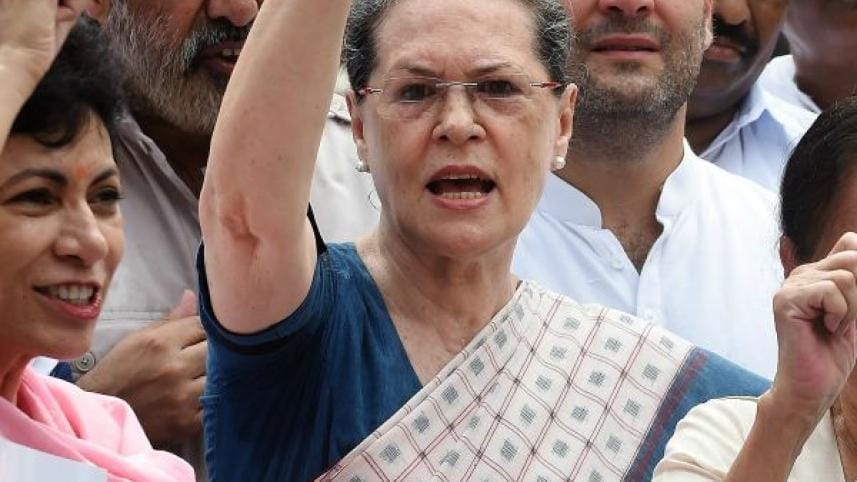Bluff is not course correction

The bizarre is not as distant from our political discourse as we might wish it to be. There are times, however, when a party's defence-offense explanation becomes so overstretched that it can only be considered contempt — not of the court, but of the people.
This morning [I write this column on Saturdays], the Times of India carried an extraordinary story on its front page. It quoted two heavyweight Congress leaders as saying that the continuous disruption of both Houses of Parliament for four days had nothing to do with the fact that the courts had served notice for the trial of Mrs. Sonia Gandhi and Rahul Gandhi for alleged manipulation of funds in order to acquire properties currently in the possession of a defunct newspaper, the National Herald, worth an estimated Rs 2,000 crore for the rather paltry sum of Rs 50 lakh. They had, they claimed, permitted their MPs to warble and hoot [earning rebuke upon rebuke from the Chair] because of much older issues.
I do not mention the names of these senior Congress leaders out of sympathy for their plight. They cannot possibly actually believe what they said. They were speaking on orders from the palace. They know as well as anyone else that there was order in Parliament before a judge in the National Herald case deemed the case worthy of trial and summoned the principal accused to appear before court. In fact, there was an excellent debate in the Rajya Sabha on Nepal which made the House nostalgic for what it should be doing as a matter of course. The opposition stung with all the force at its command, and External Affairs Minister Mrs. Sushma Swaraj's reply not only answered each point but set at rest speculation about our position on a crucial problem. This is what the Parliament is meant for. This is democracy as it should be practised. The Congress participated in this debate.
The bold headline in Goa's newspapers this morning said all that needed to be said: "National Herald: Cong stalls RS for 4th day". The man who has repeatedly made it clear that his party's problem was the newspaper case, was none other than Rahul Gandhi, who has repeatedly accused the government of playing "100% vendetta" politics, jabbing the air with anger each time he used the immortal phrase.
Naturally, he has not bothered to explain how, because there is no explanation. As Finance Minister Arun Jaitley pointed out in a blog, as well as at a press conference, the government had not sent a single notice on this case to anyone. It was the court that had seen merit in a private complaint by Dr Subramanian Swamy, and indeed made some sharp remarks in the process. It should be noted that the courts have not always responded to Dr Swamy's complaints with equal force. They deal, as they should, with each case on its merits. For Rahul Gandhi to imply that the courts are biased, as he has done repeatedly, is to challenge the integrity of the judicial system.
Congress should have understood that it would be isolated on what is a straightforward corruption allegation from the very first day on which it used vocal bullying to stall Parliament. Not a single opposition party came to its support. Even its allies in Bihar, JD(U) and RJD, kept their distance. The Trinamool Congress, which is at the moment trying to win brownie points in the hope that Congress will not enter into an alliance with the Left parties in the forthcoming Bengal Assembly elections, kept its ears open and head down. No one is going to be seen defending apparent or alleged corruption.
Political parties succeed when they gauge public response accurately. Everyone realised that the people were not buying the Congress argument. Congress took longer to recognise this because it is trapped in dynasty loyalty. A week, as has been famously noted, is a long time in politics. In this week, Congress took the national debate back to highest-level corruption and subversion of a national party to the whims and needs of dynasty.
One has no idea how Congress will behave when Parliament resumes on Monday. It is possible that hardliners will argue that Parliament disruption should continue, this time over other older charges. But the age of Alice in Wonderland politics is long gone: you cannot, like the Queen in that brilliant fable, make words mean only what you want them to mean. The court of public opinion is the most powerful judiciary in a democracy, and Congress has lost the argument there. Voters know that the party has sabotaged important bills that would help the poor, the Scheduled Castes and Tribes, and the salaried because it has taken an untenable position on a matter that is best left to the legal system, rather than the political class.
Bluff is not course correction.
The writer is Editor of The Sunday Guardian, published from Delhi, India on Sunday, published from London and Editorial Director, India Today and Headlines Today.

 For all latest news, follow The Daily Star's Google News channel.
For all latest news, follow The Daily Star's Google News channel.
Comments